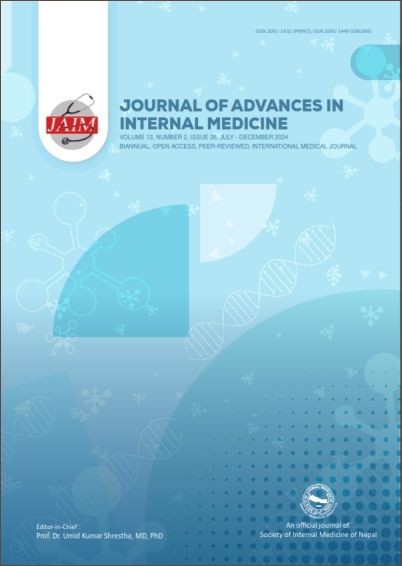Hypoalbuminemia as A Marker of Clinical and Angiographic Severity and In-Hospital Outcome in Acute Coronary Syndrome In BPKIHS, Dharan: A Cross Sectional Study
DOI:
https://doi.org/10.3126/jaim.v13i2.74064Keywords:
Hypoalbuminemia, ACS, Severity, OutcomesAbstract
BACKGROUND Serum albumin, because of its anti-inflammatory, antioxidant, anticoagulant and anti-platelet aggregation action has been linked with onset, progression and severity and appears to influence clinical outcomes among Acute Coronary Syndrome (ACS) Patients.
AIMS This study aimed to describe the association of serum albumin levels with clinical characteristics, severity and outcomes among ACS patients in a tertiary tropical hospital in Nepal.
METHODS This was a descriptive cross-sectional study where clinical and angiographic profile of patients presenting with ACS, admitted in BPKIHS between July 2024 and October 2024 were evaluated and analysed in relation to serum albumin levels. Statistical analysis was done using SPSS 23.
RESULTS A total of 100 patients with ACS admitted in the study period were included in the study. Serum albumin levels in ACS didn’t show significant association with age, gender, Killip class or Type of ACS. Risk factors found to have significant association with hypoalbuminemia were hypertension (p 0.001) and dyslipidemia. (p 0.021). Hypoalbuminemia showed significant association with severity of Coronary artery disease in terms of vessels involved (p 0.004) and Gensini Score (p 0.01). Hypoalbuminemia was significantly associated with longer CCU stay (p 0.012) and Hospital stay (p<0.001). Hypoalbuminemia had significant association with Total adverse outcomes (p<0.001) and nonfatal outcome (p <0.001), but no significant association was found with mortality. (p 0.133).
CONCLUSION Lower serum albumin were associated with higher severity of the ACS and in hospital adverse outcomes including higher non-fatal adverse outcomes and higher duration of CCU and hospital stay . Early stratification of disease based on biomarkers can guide early intervention to prevent bad outcomes.
Downloads
Downloads
Published
How to Cite
Issue
Section
License

This work is licensed under a Creative Commons Attribution 4.0 International License.
This license enables reusers to distribute, remix, adapt, and build upon the material in any medium or format, so long as attribution is given to the creator.




